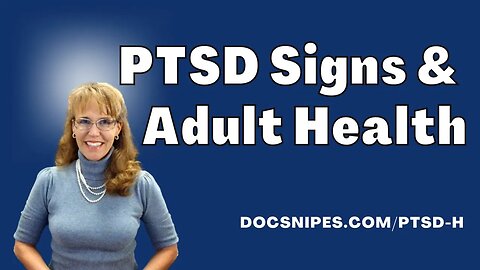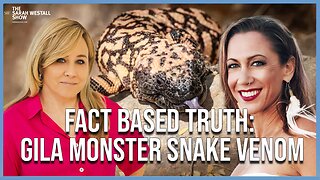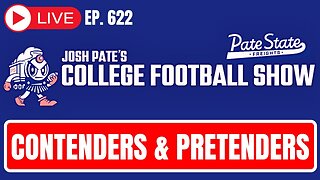Premium Only Content

PTSD Signs & Adult Health
📢SUBSCRIBE and click the BELL to get notified when new videos are uploaded.
💲 Unlimited CEUs $59 based on these videos at allceus.com for social work, counseling, marriage and family therapy, addiction counseling, case management, pastoral counseling and more.
👋 Chat with me at https://members.docsnipes.com/ For $10/month where you get access to my tips for health and wellness and you can text chat with me privately 7 days a week.
#PTSD #Trauma #counselingskills #dawnelisesnipes
PTSD and Adult Health
Dr. Dawn-Elise Snipes
AllCEUs Counselor Education
Objectives
- Explore the comorbidities with PTSD
Recognizing Trauma
- Lifetime prevalence of trauma is 60.7% of men and 51.2% of women
- The most common forms of trauma resulting in PTSD included unexpected death of someone close, sexual assault, serious illness or injury to self or someone close, serious car accident, having a child with serious illness, terrorist attack, natural disaster
Recognizing Trauma
- In complex PTSD, structural abnormalities in the brain seemed to be more extensive than in PTSD and brain activity in complex PTSD seemed to be strikingly different from the brain activity seen in PTSD patients who had experienced only single trauma
- PTSD in 2021
- Pandemic related PTSD
- Intergenerational PTS
- Cultural- PTS
Mood Disorders
- Higher rates of mood disorder comorbidity in individuals with prolonged PTSD
- Two types of responses to traumatic reminders or other stressors: D-PTSD “over-modulate” their emotions, as opposed to patients who primarily suffer from re-experiencing symptoms, including hyperarousal, intense feelings of shame, and difficulties in emotion downregulation
- BPD symptoms often overlap with under-modulators explaining one reason why not everyone with PTSD develops BPD, but there is a high proportion of people with BPD that have PTSD or a history of childhood trauma
Personality Disorders
- PTSD is positively related to
- Negative emotionality
- Neuroticism (dysregulation/ hypervigilance / the degree to which a person experiences the world as distressing, threatening, and unsafe)
- Harm avoidance
- Self-transcendence
- Hostility/anger
- Anxiety
- PTSD symptoms are negatively associated with
- Extraversion
- Conscientiousness
- Self-directedness
- High positive emotionality
- Hardiness
- Optimism
Sleep dysfunction
- 70–91% of individuals with PTSD reporting sleep disturbances
- The most common sleep disturbances in PTSD: insomnia, nightmares, and OSA
- Sleep disorders contribute to major depression, substance abuse, impaired daytime functioning, negative long-term health consequences, and suicide risk
- Insomnia may precede the trauma and predict the development of PTSD
- SSRIs & SNRIs are recommended as first-line treatments for PTSD but the effects of SSRI/SNRIs on sleep are typically modest or even adverse since they disrupt REM sleep
Sleep
- Benzos are not advised because of their risk of tolerance, abuse and worsening of OSA
- Trazodone has been shown to promote sleep and reduce nightmares in PTSD and depressed patients and may be particularly helpful for patients with concurrent alcohol use disorders and OSA
- CPAP therapy has produced small but consistent decreases in PTSD severity at 12 weeks
Health
- Autoimmune disorders
- Heart failure
- PTSD is about 10–20% following acute coronary syndromes and
- PTSD symptoms increased the risk of adverse cardiovascular events as a result of dysregulation of the autonomic nervous system (ANS), hypothalamic-pituitary-adrenal axis (HPA), oxidative stress, and inflammation
Addiction
- Addiction
- Addiction can be used to self-medicate trauma or traumatic symptoms
- Trauma affects the dopaminergic pathway in ways that largely mimic the effects of addictive drugs causing increased dopamine release in the nucleus accumbens
- Stress enhances the effects of drug-related cues on the dopaminergic system, leading to increased cue-induced craving and reinstatement of drug self-administration
- Repeated or prolonged exposure to stress can also recapitulate some of the core pathophysiology of SUD including sensitization of the dopaminergic response
Addiction
- Alcohol
- Psychiatric disorders that are comorbid with AUD, such as PTSD, MDD, and other substance use disorders, may also have underlying neuroimmune mechanisms
- Benzodiazepines
- Opioids
- Opioid pretreatment robustly augments associative fear learning in the amygdala although these changes were not observed when opioids were given after the traumatic event
References
- All references used in creating this presentation are linked throughout the powerpoint which is available in the related class at AllCEUs.com.
- Check the video notes for a link to the class.
Video by Dr. Dawn Elise Snipes on integrative behavioral health approaches including counseling techniques and skills for improving mental health and reducing mental illness.
-
 LIVE
LIVE
Alex Zedra
4 hours agoLIVE! Verdansk all night <3
329 watching -
 1:22:13
1:22:13
Sarah Westall
6 hours agoTruth about Gila Monster Snake Venom & the Miracle of Peptides for Human Health w/ Dr. Diane Kazer
59.2K14 -
 2:18:43
2:18:43
Tundra Tactical
4 hours ago $2.65 earned$3200 ZEV HEARTBREAKER Contest!!!
28.7K1 -
 LIVE
LIVE
EuphioniaStudio
3 hours ago $0.04 earnedIt's BAAAASED, MARIO! | Mario Party 4
288 watching -
 LIVE
LIVE
ADH Gaming
6 hours agoWarzone Kar98 Iron sight Quick scopes
49 watching -
 2:48:34
2:48:34
Adam Does Movies
13 hours ago $2.89 earnedAll The Big Movie Announcements From CinemaCon 2025- LIVE!
38K -
 1:07:30
1:07:30
Josh Pate's College Football Show
6 hours ago $3.53 earnedBig CFB Changes Coming | USC + Texas + Alabama In 2025 | Truth About Officiating | I Am Engaged
39.5K1 -
 4:43:40
4:43:40
Biscotti-B23
9 hours ago $1.79 earned🔴 LIVE VIEWERS VS MEMBERS BEEF 🔥 FINDING A NEW MAIN ⚔ BLEACH REBIRTH OF SOULS
28.3K2 -
 3:21:55
3:21:55
DTDUBtv
6 hours agoOUTLAST TRIALS WITH SARAHSLOTH17
26.8K -
 LIVE
LIVE
Major League Fishing
5 days agoLIVE! - MLF Bass Pro Tour: REDCREST - Day 4
5,983 watching